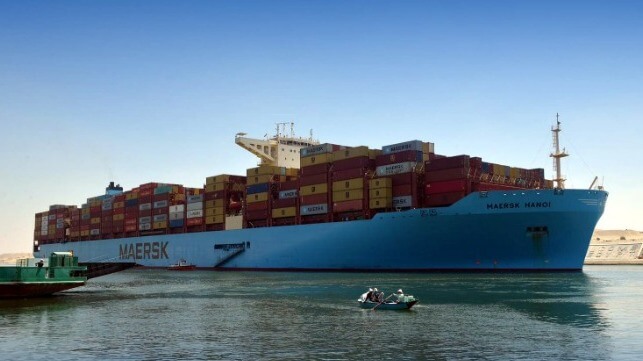Maersk Says “Not Yet” for Return to Red Sea Routing

Three months after starting to divert all its vessels from a passage through the Red Sea, Maersk told customers today that it is too soon in its assessment to resume its normal routes. They said the routing around Africa allows the best supply chain stability, in their assessment, saying that a switch is complex and they wanted to make sure it would be sustained over the long term and avoid further disruption.
They write that they are aware that Operation Aspides has taken shape and welcome it as a positive development along with the U.S.-led efforts. Maersk writes that they are also in “continuous dialogue” and monitoring developments in the region.
“Regretfully, both our internal analysis, as well as insight we received from external sources, still indicates that the risk level in the region remains elevated,” they wrote in their latest customer alert.
Maersk vessels were targeted by the Houthi on two different occasions in December leading the carrier to first suspend, then resume, and then suspend again transits through the region around the Bab el-Mandeb Strait. The Maersk Gibraltar had a near-miss incident on December 14 leading to the first pause. After getting security assurances after the U.S.-led effort began, at the end of December Maersk said it was updating voyage plans on a vessel-by-vessel basis, which would see the first vessels pass through the Red Sea again.
A day after they informed customers that they were resuming some transits, the Maersk Hangzhou on December 30 was hit by an unknown object. The ship had passed through the Bab al-Mandab Strait sailing from Singapore to Port Suez, Egypt. While there was no indication of a fire on board, Maersk said out of a concern for crew safety they were again rerouting all sailings.
“At Maersk, we are aware that some other shipping lines have continued sailing through the Red Sea despite security risks or have announced their plans to resume sailing,” the March 22 alert says. “We respect the right of each carrier to make such decisions individually. At the same time, we continue with our own assessment that the current situation does not allow us to make a similar decision and thus still believe that sailing via the Cape of Good Hope and around Africa is the most reasonable solution at the moment and the one that currently allows the best supply chain stability.”
Aspides reported this week that it has been in place for a month and already escorted 35 merchant vessels. They reported the defensive actions led to the shooting down of eight UAVs and the repelling of three other UAV attacks. Since then, the French shot down another UAV targeting a ship they were protecting, the German warship Hessen destroyed a USV while it was escorting a ship, intercepted and destroyed 3 ballistic missiles while yesterday the French reported they intercepted and destroyed three more ballistic missiles.
Among the major carriers, only CMA CGM has said it was prepared to resume transits. At the end of February after having suspended transits they advised customers that they had “reevaluated the situation in the Southern Area of the Red Sea.” They said the situation was being assessed for each ship individual.
Previously, Rodolphe Saadé, Chairman & CEO of the CMA CGM Group, told the Financial Times they were making the Red Sea transits when they could be escorted. He said the disruptions were playing havoc on their schedule and even when they were making the trips they were often having to wait for their escorts.

that matters most
Get the latest maritime news delivered to your inbox daily.
MSC reported it was also avoiding the transit. Even still, one of its vessels heading to Djibouti was attacked on March 4 with a small fire started in containers. The Indian Navy assisted with the fire and the MSC vessel was able to continue its voyage.
Most of the transits are being made by smaller operators. BIMCO reported this week that traffic through the region was down by 50 percent in January and February. In the first three weeks of March, they calculated that the gross tonnage transiting the Suez Canal had dropped 61 percent year-over-year.
